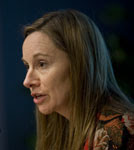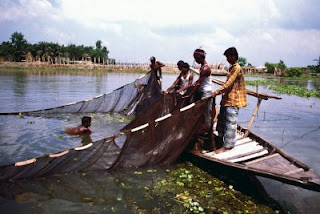-
Video: Malcolm Potts on ‘Sex and War’
›March 6, 2009 // By Wilson Center Staff“What is the thing that may make the world as peaceful as possible?” asks Malcolm Potts in this video from the Environment Change and Security Program. “I think it’s very important to give women as much autonomy in society as we possibly can; to fight as hard as possible for women’s equality. Because these behaviors that created warriors never benefited women.”
In this short expert analysis, Malcolm Potts, Bixby Professor of Population and Family Planning at the University of California Berkeley, discusses his latest book, Sex and War: How Biology Explains Warfare and Terrorism and Offers a Path to a Safer World. To learn more, please see a full summary and complete video of Malcom Potts speaking recently about his book at a February 11, 2009, Wilson Center event.
-
Mind the Gap: Forging a Consensus on Security and Climate Change in EU and US Foreign Policy
›March 5, 2009 // By Will Rogers “There are political and economic vulnerabilities that are in fact more important—or seem more important—to the participants of conflict than the physical vulnerability to climate change,” said Clionadh Raleigh at the February 19, 2009, event, “Climate Security Roundtable: U.S. and EU Research and Policy.” Raleigh, a lecturer at Trinity College Dublin, was joined by Nick Mabey, founding director and chief executive of E3G, and Sharon Burke, a senior fellow at the Center for a New American Security, to discuss climate change’s impact on conflict and how the United States and European Union (EU) have begun to adapt their foreign and security policies to the threat of climate change.
“There are political and economic vulnerabilities that are in fact more important—or seem more important—to the participants of conflict than the physical vulnerability to climate change,” said Clionadh Raleigh at the February 19, 2009, event, “Climate Security Roundtable: U.S. and EU Research and Policy.” Raleigh, a lecturer at Trinity College Dublin, was joined by Nick Mabey, founding director and chief executive of E3G, and Sharon Burke, a senior fellow at the Center for a New American Security, to discuss climate change’s impact on conflict and how the United States and European Union (EU) have begun to adapt their foreign and security policies to the threat of climate change.
Ecological Change, Migration, and Conflict: A Complex Story
“The lack of access to power for certain communities, certain ethnic groups in sub-Saharan Africa, and basic access to resources among the most vulnerable populations has led to people misinterpreting the relationship that ecological change plays in their decision to either participate in conflict or to migrate,” Raleigh said. Although Raleigh’s research, which examined civil conflicts from 1990 to 2004, found that population density and growth were related to higher risks of conflict, “environmental pressures were not more likely to cause conflict in poor states—and not more likely during periods of instability,” she concluded. “Social, political, and economic factors are the most important determinants of civil war within developing countries,” she emphasized. “Poverty and unequal development come up time and time again.”
According to Raleigh, fears of mass international migration in response to climate change are overplayed. “Individuals and communities have quite a lot of coping mechanisms to deal with ecological difficulty,” including migration from rural to urban areas in the same country, she explained. Most migration, including labor and distress migration, “is temporary, internal, and circular,” she emphasized. “There is very little to no evidence that there will be an increase in international migration” in response to ecological change, although “there is evidence that there will be an increase in internal migration.”
Climate Change and Security: Perspectives from the EU “Climate change is serious,” emphasized Mabey. “It’s a threat multiplier, it will make unstable places less stable—it’s going to change strategic interests, alliances, borders, threats, economic relationships, comparative advantages, the nature of international relations, and the legitimacy of the UN.” In the future, “security policy will need to get more preventive and risk-based because climate change just injects a huge bolt of uncertainty into the future,” said Mabey. He urged the expansion of forward-looking information systems that provide policymakers with the data they need to make decisions at the geopolitical, strategic, and operations levels. He also said security experts should strive to communicate the potential consequences of climate change to decisionmakers.
“Climate change is serious,” emphasized Mabey. “It’s a threat multiplier, it will make unstable places less stable—it’s going to change strategic interests, alliances, borders, threats, economic relationships, comparative advantages, the nature of international relations, and the legitimacy of the UN.” In the future, “security policy will need to get more preventive and risk-based because climate change just injects a huge bolt of uncertainty into the future,” said Mabey. He urged the expansion of forward-looking information systems that provide policymakers with the data they need to make decisions at the geopolitical, strategic, and operations levels. He also said security experts should strive to communicate the potential consequences of climate change to decisionmakers.
The EU has taken steps to integrate climate change into its security strategy; Great Britain, Germany, and Denmark have taken the lead. The Arctic has been a particular focus, with security experts examining trade routes, maritime zones, and new access to resources. Climate change “is not all about instability” in fragile, impoverished states, Mabey explained. “The Arctic is by far the most important climate security issue in the minds of traditional foreign-policy types in Europe.”
Environmental Security Gets a New Tool: The Climate War Game Last year, Burke helped conduct a climate change war game based on a scenario of extreme weather events like droughts, wildfires, and cyclones. “Every country sort of hewed to what you would expect,” said Burke of the high-profile participants from China, India, Europe, and the United States. “The EU team spent the first two hours debating whether they could really be a country; the Indian team instantly came up with a negotiating strategy that sounded cooperative and brilliant but was completely impossible to execute; the Chinese team was, ‘No, we’re not going to do anything unless you pay us’; and the American team was keen to lead, only nobody was following.” One of the key lessons from the game, Burke explained, was that “everything comes down to what China is prepared to do.”
Last year, Burke helped conduct a climate change war game based on a scenario of extreme weather events like droughts, wildfires, and cyclones. “Every country sort of hewed to what you would expect,” said Burke of the high-profile participants from China, India, Europe, and the United States. “The EU team spent the first two hours debating whether they could really be a country; the Indian team instantly came up with a negotiating strategy that sounded cooperative and brilliant but was completely impossible to execute; the Chinese team was, ‘No, we’re not going to do anything unless you pay us’; and the American team was keen to lead, only nobody was following.” One of the key lessons from the game, Burke explained, was that “everything comes down to what China is prepared to do.”
In developing the game, Burke and her colleagues discovered “that there’s a vast poverty of the kinds of information that you need to make decisions.” As Burke explained, policymakers need specific data “to obligate large amounts of money and personnel,” and the game revealed that “policymakers don’t have the information they need to make decisions.”
Photos: From top to bottom, Clionadh Raleigh, Nick Mabey, and Sharon Burke. Courtesy of Dave Hawxhurst and the Woodrow Wilson Center. -
VIDEO: From Report 13 – Christian Leuprecht on Migration as the Demographic Wild Card in Civil Conflict
›March 3, 2009 // By Wilson Center StaffContrary to what many people might think, most migration is within the developing world—“among countries that already face enormous challenges in terms of provisions for their populations, but also ethnic conflict,” says Christian Leuprecht in this short video preview of his article, “Migration as the Demographic Wild Card in Civil Conflict: Mauritius and Fiji,” now appearing in the 13th issue of Environmental Change and Security Program Report.
“So if you have particular ethnic groups, religious groups, or linguistic groups then spilling over borders, there’s a good chance they might destabilize the neighboring country; not just because of carrying capacity and provision of services within that country, but also because it changes the population dynamics and group dynamics within that particular country,” says Leuprecht.
Leuprecht, an assistant professor at the Royal Military College of Canada, and six other demographic experts analyze the links connecting population and environmental dynamics to conflict in a set of commentaries on “New Directions in Demographic Security.” -
Testosterone: The Ultimate Weapon of Mass Destruction?
›March 1, 2009 // By Will Rogers “The ultimate weapon of mass destruction—and perhaps of economic destruction—is the testosterone molecule,” quipped Malcolm Potts at the February 11, 2009, discussion of his new book, “Sex and War: How Biology Explains War and Offers a Path to Peace,” which explores the pivotal question, “Why do human beings systematically and deliberately kill our own species?” Potts, the Bixby Professor of Population and Family Planning at the University of California, Berkeley, was joined Science magazine’s Ann Gibbons, a leading correspondent on human evolution, who examined whether aggressive human behaviors are evolving in response to changing social structures.
“The ultimate weapon of mass destruction—and perhaps of economic destruction—is the testosterone molecule,” quipped Malcolm Potts at the February 11, 2009, discussion of his new book, “Sex and War: How Biology Explains War and Offers a Path to Peace,” which explores the pivotal question, “Why do human beings systematically and deliberately kill our own species?” Potts, the Bixby Professor of Population and Family Planning at the University of California, Berkeley, was joined Science magazine’s Ann Gibbons, a leading correspondent on human evolution, who examined whether aggressive human behaviors are evolving in response to changing social structures.
Testosterone: Risky Business
“In 1987, some anthropologists and sociologists made a statement at UNESCO that it is scientifically incorrect to say we’ve inherited a tendency to make war from our animal ancestors,” said Potts. “I think that that is wrong.” Evolutionary psychology suggests that humans have inherited certain predispositions that “help us adapt to find food, select mates, avoid danger, and compete for resources in a hostile world,” said Potts. Men compete for women, so it is logical, from a reproductive standpoint, that men would take more risks than women, he argued.
In addition, “there’s strong evidence that there is a genetic tendency for men in the prime of life to attack and kill their neighbors,” Potts noted, while emphasizing that this does not mean that men are preordained to fight one another. “Such predispositions are extraordinarily flexible,” and respond well to peaceful cultural norms.
The Pill Is Mightier Than the Sword
“Once we recognize our violent origins, then we need to ask not ‘why do wars break out?’ but ‘why does peace break out?’” posed Potts. “Judged on the basis of same-species killing,” the violent 20th century may have been the most peaceful in human history, he claimed.
“In the whole of recorded history, I cannot find a single example of women banding together spontaneously and then going out to attack a neighboring group,” maintained Potts. He argued that increasing women’s individual freedom and collective power in civil society and government is the best way to achieve a more peaceful world. More specifically, slowing population growth and promoting more balanced age structures by giving women access to family planning will contribute not just to their own autonomy, but also to long-term peace, he argued.
Evolving To Become Less Aggressive?
“Humans are capable of incredible acts of kindness but also despicable acts of terror,” said Gibbons. “We murder, slaughter, barbeque, and even eat our own species, and we’ve been doing it for a long time.” But it is difficult to determine whether this propensity for aggression is an ancient trait or has more recently evolved. “There are no other human species alive to show us different models for male aggression…so we have look at fossils, DNA, and our closest relatives—the chimpanzees and gorillas,” Gibbons said.
Human aggression may be continuing to evolve. As Gibbons explained, “researchers, as they look at the human genome project—the HapMap Project—have discovered there are many, many genes that have come under natural selection that have evolved in the last 100,000 years, since modern humans spread out of Africa.” Therefore, as warfare becomes less necessary to our daily survival, our species might evolve to become less aggressive. “Are we seeing, in our sexual selection, mates being chosen that are a little less aggressive?” Gibbons asked. “We are still evolving,” she emphasized. “The story isn’t over yet.”Photos: From top to bottom, Malcolm Potts and Ann Gibbons. Courtesy of Dave Hawxhurst and the Woodrow Wilson Center.
-
Reading Radar — A Weekly Roundup
›February 27, 2009 // By Wilson Center Staff A new study published in Conservation Biology (abstract) calculates that more than 80 percent of major armed conflicts from 1950-2000 have taken place in one of the world’s 34 biodiversity hotspots. “The fact that so many conflicts have occurred in areas of high biodiversity loss and natural resource degradation warrants much further investigation as to the underlying causes, and strongly highlights the importance of these areas for global security,” says coauthor Russell A. Mittermeier. He and lead author Thor Hansen argue that protecting nature during war can help recovery, and call for integrating conservation “into military, reconstruction and humanitarian programs in the world’s conflict zones.”
A new study published in Conservation Biology (abstract) calculates that more than 80 percent of major armed conflicts from 1950-2000 have taken place in one of the world’s 34 biodiversity hotspots. “The fact that so many conflicts have occurred in areas of high biodiversity loss and natural resource degradation warrants much further investigation as to the underlying causes, and strongly highlights the importance of these areas for global security,” says coauthor Russell A. Mittermeier. He and lead author Thor Hansen argue that protecting nature during war can help recovery, and call for integrating conservation “into military, reconstruction and humanitarian programs in the world’s conflict zones.”
The Bixby Forum, “World in 2050: A Scientific Investigation of the Impact of Global Population Changes on a Divided Planet” included panels on population’s links to war, climate change, and the environment. Malcolm Potts, the chair of the University of California, Berkeley’s Bixby Center for Population Health and Sustainability recently spoke at the Wilson Center about his latest book, Sex and War.
In Troubled Waters: Climate Change, Hydropolitics, and Transboundary Resources from the Henry L. Stimson Center, experts from South Asia, Southeast Asia, and the Middle East “examine the environmental dangers and policy dilemmas confronting the sustainable management of shared water resources in a warming world”—including the potential for conflict. In the concluding chapter, David Micheli finds that climate change is unlikely to lead to full-scale “water wars,” but warns that “rising climatic stresses on common waters will put new and perhaps unprecedented strains on cooperative governance institutions at the local, national, and international levels.”
Rampant logging fueled Cambodia’s decades-long civil war. Now a new report from transparency watchdogs Global Witness, Country for Sale, claims that the country’s emerging oil and mineral sectors may pose a similar threat. Says Gavin Hayman, “The same political elite that pillaged the country’s timber resources has now gained control of its mineral and petroleum wealth. Unless this is changed, there is a real risk that the opportunity to lift a whole generation out of poverty will be squandered.”
Thirty-three countries have been named “highly vulnerable” to the impact of climate change on their fisheries by a new study published in Fish and Fisheries. In these countries, two-thirds of which are in tropical Africa, fish accounts for 27 percent or more of daily protein intake, compared to 13 percent in non-vulnerable nations. InterPress examines the impact of acidification and rising surface temperatures on the fish stocks of coastal South Africa.
Photo: Fish-dependent people of Bangladesh could see their coastal catch reduced as a result of predicted increases in the frequency and intensity of tropical storms. Bangladesh is one of the nations identified as highly dependent on fisheries along with Cambodia, DR Congo, Madagascar, Sierra Leone, Tanzania, and Uganda. Photo credit: Mark Prein, courtesy of WorldFish Center. -
From Report 13: Watch Jennifer Dabbs Sciubba on Population in Defense Policy Planning
›February 25, 2009 // By Wilson Center Staff“Demography will have a greater role in defense planning in the future,” says Jennifer Dabbs Sciubba in this short video preview of her article, “Population in Defense Policy Planning,” now appearing in the 13th issue of Environmental Change and Security Program Report. “Robert Gates has put a lot of emphasis on development as a key to peace, and Africa Command may be the area that brings together issues of demography, the environment, and development, and sends those observations back up the higher levels at DOD,” she observes. Sciubba, Mellon Environmental Fellow in the Department of International Studies at Rhodes College, and six other demographic experts analyze the links connecting population and environmental dynamics to conflict in a set of commentaries on “New Directions in Demographic Security.” -
PODCAST – A Discussion on Climate Change and Security: Arctic Links and U.S. Intelligence Community Responses
›February 24, 2009 // By Wilson Center Staff“The climate issue also very clearly illustrates the whole complexity of the security issue,” says Henrik Selin. “Arctic melting is a national security issue in the traditional national security kind of way.” In this podcast from the Environmental Change and Security Program, Selin, assistant professor of international relations at Boston University, and Stacy VanDeveer, associate professor of political science at the University of New Hampshire, sat down with ECSP Director Geoff Dabelko to discuss the resonance of climate change in the U.S. security community.
VanDeveer and Selin were in Washington to speak at a January 12 event, “Governing the Climate: Lessons From the National Conference on Climate Governance.” VanDeveer has frequently coauthored articles with Dabelko, including “It’s Capacity, Stupid: International Assistance and National Implementation” in Global Governance, “European Insecurities: Can’t Live With ’Em, Can’t Shoot ‘Em” in Security Dialogue, and “Environmental Cooperation and Regional Peace: Baltic Politics, Programs, and Prospects” in Environmental Peacemaking. -
New Director of National Intelligence Assesses Climate, Energy, Food, Water, Health
›February 18, 2009 // By Rachel WeisshaarIn the annual threat assessment he presented last week to the Senate Select Committee on Intelligence, new Director of National Intelligence Dennis Blair named the global economic crisis—not terrorism—the primary near-term threat to U.S. national security, prompting accusations of partisanship from the Washington Times. Yet as the U.S. Naval War College’s Derek Reveron notes, “the economic turmoil of the early 20th century fueled global instability and war,” and today’s economic collapse could strengthen extremists and deprive U.S. allies of the funds they need to deploy troops or increase foreign assistance to vulnerable regions.
Further down the list of potential catastrophes—after terrorism, cybersecurity, and the “arc of instability” that stretches from the Middle East to South Asia—the assessment tackles environmental security threats. The four-page section, which likely draws on sections of the recent National Intelligence Council report Global Trends 2025: A Transformed World, summarizes the interrelated natural-resource and population challenges—including energy, food, water, demography, climate change, and global health—the U.S. intelligence community is tracking.
The world will face mounting resource scarcity, warns Blair. “Access to relatively secure and clean energy sources and management of chronic food and water shortages will assume increasing importance for a growing number of countries. Adding well over a billion people to the world’s population by 2025 will itself put pressure on these vital resources,” he writes.
Drawing on the conclusions of the 2008 National Intelligence Assessment on the impacts of global climate change to 2030, Blair portrays climate change as a variable that could place additional strain on already-stressed agricultural, energy, and water systems: “We assess climate change alone is unlikely to trigger state failure in any state out to 2030, but the impacts will worsen existing problems such as poverty, social tensions, environmental degradation, ineffectual leadership, and weak political institutions.” Direct impacts to the United States include “warming temperatures, changes in precipitation patterns, and possible increases in the severity of storms in the Gulf, increased demand for energy resources, disruptions in US and Arctic infrastructure, and increases in immigration from resource-scarce regions of the world,” writes Blair.
Africa, as usual, is the last of the world’s regions to be analyzed in the assessment. Blair notes that “a shortage of skilled medical personnel, deteriorating health systems, and inadequate budgets to deal with diseases like HIV/AIDS, malaria, and tuberculosis” is threatening stability in sub-Saharan Africa, and explains that agriculture, which he rightly calls “the foundation of most African economies,” is not yet self-sufficient, although some countries have made significant improvements in infrastructure and technology. He highlights ongoing conflicts in the Democratic Republic of the Congo, Nigeria, Sudan, and Somalia as the most serious security challenges in Africa. He fails to note, however, that all four have environmental/natural resource dimensions (see above links for details).
Showing posts from category security.


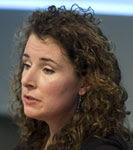 “There are political and economic vulnerabilities that are in fact more important—or seem more important—to the participants of conflict than the physical vulnerability to climate change,” said Clionadh Raleigh at the February 19, 2009, event, “
“There are political and economic vulnerabilities that are in fact more important—or seem more important—to the participants of conflict than the physical vulnerability to climate change,” said Clionadh Raleigh at the February 19, 2009, event, “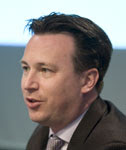 “Climate change is serious,” emphasized Mabey. “It’s a threat multiplier, it will make unstable places less stable—it’s going to change strategic interests, alliances, borders, threats, economic relationships, comparative advantages, the nature of international relations, and the legitimacy of the UN.” In the future, “security policy will need to get more preventive and risk-based because climate change just injects a huge bolt of uncertainty into the future,” said Mabey. He urged the expansion of forward-looking information systems that provide policymakers with the data they need to make decisions at the geopolitical, strategic, and operations levels. He also said security experts should strive to communicate the potential consequences of climate change to decisionmakers.
“Climate change is serious,” emphasized Mabey. “It’s a threat multiplier, it will make unstable places less stable—it’s going to change strategic interests, alliances, borders, threats, economic relationships, comparative advantages, the nature of international relations, and the legitimacy of the UN.” In the future, “security policy will need to get more preventive and risk-based because climate change just injects a huge bolt of uncertainty into the future,” said Mabey. He urged the expansion of forward-looking information systems that provide policymakers with the data they need to make decisions at the geopolitical, strategic, and operations levels. He also said security experts should strive to communicate the potential consequences of climate change to decisionmakers. Last year, Burke helped conduct a
Last year, Burke helped conduct a 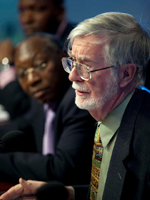 “The ultimate weapon of mass destruction—and perhaps of economic destruction—is the testosterone molecule,” quipped Malcolm Potts at the February 11, 2009, discussion of his new book, “
“The ultimate weapon of mass destruction—and perhaps of economic destruction—is the testosterone molecule,” quipped Malcolm Potts at the February 11, 2009, discussion of his new book, “